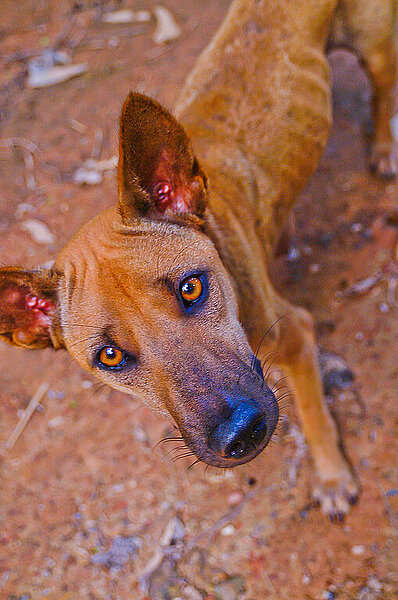Malnutrition

Malnutrition is a serious problem that can affect your dog's health and well-being. Malnutrition means that your dog is not getting enough of the nutrients it needs for a healthy life. This can have various causes, such as a poor diet, poor digestion, illness or infection.
Symptoms of malnutrition
How can you tell if your dog is malnourished? There are a few signs you should look out for, such as
- Weight loss or underweight
- Weakness or lethargy
- Poor coat or hair loss
- Dry or flaky skin
- Dental problems or inflammation of the gums
- Susceptibility to infections or parasites
- Behavioral changes or depression
If you notice one or more of these symptoms in your dog, you should take him to the vet as soon as possible. They will be able to determine the cause of the malnutrition and recommend suitable treatment.
Causes of malnutrition
There are various factors that can lead to malnutrition in dogs. Some of them are:
- Improper diet: if you don't give your dog the right food that meets his needs, he may develop a deficiency in certain vitamins, minerals, fatty acids or proteins. For example, puppies need more calories and protein than adult dogs, and older dogs need fewer calories and more fiber. The quality of the food is also important. Cheap food often contains poor quality ingredients that are not easily digestible or may contain harmful additives.
- Poor digestion: If your dog has problems with digestion, it cannot absorb the nutrients from the food properly. This can be caused by various conditions, such as gastrointestinal inflammation, pancreatic insufficiency, liver or kidney disease or allergies.
- Illness or infection: If your dog is ill or has an infection, his metabolism may be disturbed and he may consume more nutrients than normal. He may also lose his appetite or have diarrhea or vomiting, leading to a loss of fluids and electrolytes.
- Parasites: If your dog is infested with parasites, such as worms, fleas or ticks, they can suck out his nutrients or damage his intestinal wall. This can lead to anemia, weight loss and immunodeficiency.
Treatment of malnutrition
The treatment of malnutrition depends on the cause. The vet will examine your dog thoroughly and, if necessary, carry out blood tests or other tests to make a diagnosis. They will then recommend a diet plan tailored to your dog's needs. This may include the following:
- A switch to a high-quality food that contains all the necessary nutrients
- Supplementation with vitamins, minerals, fatty acids or proteins
- Adjusting the amount and frequency of feeding
- Avoiding foods that trigger allergies or are difficult to digest
- Treatment of parasites or infections with medication
- Fluid and electrolyte therapy for dehydration
Treatment of malnutrition can take several weeks to months, depending on the severity of the problem and your dog's health. You should visit the vet regularly to check your dog's progress and make adjustments if necessary.
Prevention of malnutrition
The best way to prevent malnutrition in your dog is to provide him with a balanced and healthy diet that meets his needs. You should stick to the following guidelines:
- Choose a high-quality food that comes from a reputable manufacturer and contains all the necessary nutrients
- Follow the feeding recommendations on the packaging or ask your vet about the optimal amount of food for your dog
- Do not change food too often or too abruptly, as this can lead to digestive problems
- Always offer your dog fresh water and make sure he drinks enough
- Avoid giving your dog human food or treats that contain too many calories, fat, sugar or salt or can cause allergies
- Worm your dog regularly and protect him from fleas and ticks
- Take your dog to the vet regularly for routine check-ups and vaccinations
Malnutrition is a serious problem that can affect your dog's health and quality of life. If you notice the signs of malnutrition in your dog, you should take him to the vet as soon as possible. With a proper diagnosis and treatment, you can help your dog get fit and happy again.
The authors assume that a veterinarian should be consulted if an animal is ill and that medication should only be taken after consultation with a doctor or pharmacist. Only an individual examination can lead to a diagnosis and treatment decision.
We help you find the nearest vet → This way